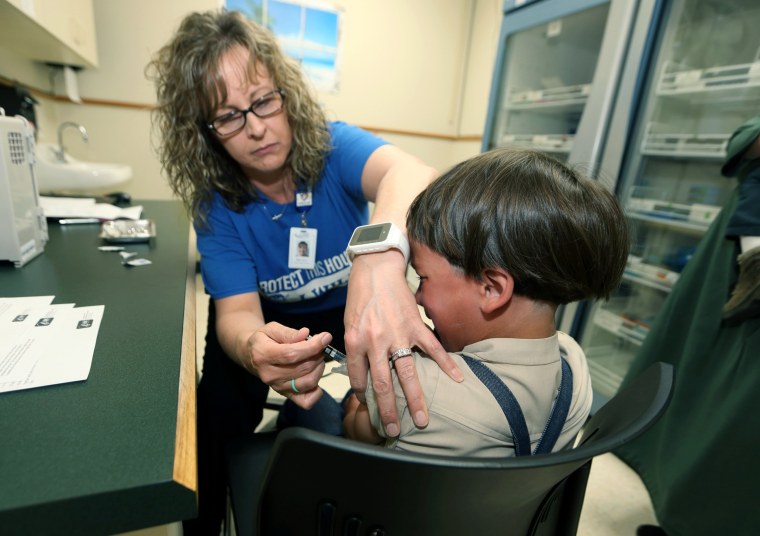The number of measles cases reported in the U.S. this year has now reached a level not seen in 27 years, causing concern among public health officials that the country could soon lose its measles elimination status.
The Centers for Disease Control and Prevention reported Thursday that there have been 971 cases of measles reported in the first five months of 2019. That surpasses the 963 cases for the entire year in 1992.
By far, the greatest number of measles cases this year has been reported in two areas of New York: Rockland County and New York City. The CDC said that those outbreaks have been ongoing for nearly eight months.
And if they continue through the summer and fall, officials said, the country could lose an important public health victory: its status as a nation that has eliminated measles. The U.S. officially made that declaration in 2000, which meant there was no longer sustained local transmission of the disease.
"It’s like turning back the clock," said Dr. William Schaffner, an infectious disease specialist at Vanderbilt University Medical Center.
However, Schaffner said that the current outbreaks could be stopped quickly with swift action.
"If every unvaccinated child in the U.S. were vaccinated today, Friday, May 31," Schaffner told NBC News, "the outbreak would be over across the country by June 15."
But thanks to a vocal anti-vaccine contingent, that's easier said than done.
The MMR vaccine, which protects against measles, mumps and rubella, was first licensed in the U.S. in 1963, and has been shown repeatedly to be safe. Any and all alleged links between the vaccine and autism have been fully debunked.
Indeed, “the way to end this outbreak is to ensure that all children and adults who can get vaccinated, do get vaccinated," the CDC's director, Dr. Robert Redfield, said in a statement. "I want to reassure parents that vaccines are safe, they do not cause autism. The greater danger is the disease the vaccination prevents.”
The CDC recommends that everyone older than 1 receive two doses of the MMR vaccine. But babies younger than 1 traveling internationally should receive the first dose before leaving the U.S.
The CDC estimates that, before the vaccine was widely administered, 3 million to 4 million people became sick with measles every year in the U.S. Annually, 400 to 500 people died.
Measles is a respiratory illness that can cause fever and rash, as well as more serious consequences such as permanent hearing loss and encephalitis, or swelling of the lining of the brain.
The virus can live outside the body for up to two hours after an infected person coughs or sneezes. “If other people breathe the contaminated air or touch the infected surface, then touch their eyes, noses or mouths, they can become infected,” according to the CDC’s website.
The virus's hardiness is why measles is thought to be the most contagious virus in existence.
"The virus will find you if you are susceptible and you are anywhere close to someone who has the illness," Schaffner said. "It has a great capacity to keep spreading from person to person."
FOLLOW NBC HEALTH ON TWITTER & FACEBOOK

